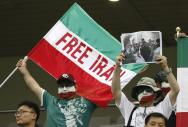 AFP
AFP
Iranian football fans protest Iranian election results at 2010 World Cup Asian qualifier at Seoul World Cup Stadium, on June 17, 2009.
| |
IN a football World Cup qualifying match in South Korea last week, at least six Iranian players, including team captain Mohammed Ali Karimi, wore green wristbands in a defiant show of support for Iran`s opposition leader Mir-Hossein Mousavi.
上周,在韩国举行的世界杯预选赛上,至少6名伊朗国家足球队队员(其中还包括队长Mohammed Ali Karimi)佩戴绿色腕带,公开支持伊朗反对派领导人穆萨维。
These football players were one tiny group of Mousavi supporters who, both before and after the presidential election, have taken to wearing green -the campaign color during rallies in Tehran, capital of Iran.
这些球员只是穆萨维拥护者中的一小部分。大选前后,众拥护者曾在伊朗首都德黑兰身着绿色服饰(穆萨维的竞选运动以绿色为主调),组织示威游行。
Correspondent Robert Dreyfuss of The Nation magazine in US reported that protesters took to the streets, turning the entire capital into a sea of green, after the election results were revealed. "The wave is green. All over the capital, there are green signs and banners supporting Mousavi. Cars flying green flags speed through the city, honking horns for Mousavi." Dreyfuss wrote.
据美国《民族》杂志记者Robert Dreyfuss报道,竞选结果公布后,抗议者们涌上街头,整个德黑兰仿佛一片绿色汪洋。Dreyfuss在报道中写道:“绿潮涌动,拥护穆萨维的绿色标牌和横幅遍布首都各处。更有飘着绿色旗帜的车群在城市中疾驰而过,为穆萨维鸣笛。”
The color green is a potent symbol for Iran, but they`re not alone in adopting a color as a symbol of political change. Other countries have used colors to represent revolution or unity, leading to the now-popular term "color revolution".
绿色是伊朗强有力的象征。但是,采用颜色作为政权变更象征的远不止伊朗一家,其他国家也曾用不同颜色来代表革新或者统一。由此引出了当前非常热门的“颜色革命”一词。
This term is used by movements that have appeared in the post-communist world in Central and Eastern Europe, and Central Asia after the collapse of the Soviet Union. Protesters have chosen a particular color or flower as their symbol. These color revolutions have mostly used nonviolent resistance to attack what are seen as corrupt or authoritarian governments. Here are some notable examples.
苏联解体后,它在中欧、东欧和中亚等后共产主义世界爆发的运动中频频出现。抗议者们通常会选择某种特定的颜色或花朵作为象征,“颜色革命”因此而得名。这些“颜色革命”通常采取非暴力抵抗的形式攻击腐败或独裁政府。以下是其中一些著名事件:
Ukraine: orange
乌克兰:橙色革命
The 2004 Ukrainian presidential election was thought to be corrupt and fraudulent. After a run-off vote, the exit poll showed that the candidate Viktor Yushchenko had led the voting by 11 percent, but the official results gave the election to the other candidate Viktor Yanukovych, who only got 3 percent of the vote. Many Yushchenko supporters took to the street wearing orange or carrying orange flags and began protesting, leading to an annulment of the vote and a new vote. The re-vote gave Yushchenko a clear victory and the Orange Revolution had reached a peaceful conclusion.
提到2004年的乌克兰总统大选,人们总免不了联想到腐败和欺诈。最后一轮投票后,票数显示候选人Viktor Yushchenko以11%的票数领先,然而最终胜出的竟然是候选人Viktor Yanukovych,尽管他只获得了3%的票数。众多Yushchenko的拥护者们涌上街头,穿着橙色服饰,挥舞着橙色旗帜游行抗议,最终迫使政府重新进行投票。第二次投票中,Yushchenko大获全胜,“橙色革命”和平告终。
Kyrgyzstan: tulip
吉尔吉斯斯坦:郁金香革命
The Tulip Revolution was a coup that overthrew President Askar Akayev and his Kyrgyzstan government. The Kyrgyz government had become increasingly corrupt and authoritarian by the mid-1990s under Akayev`s rule. After the fraudulent March 2005 parliamentary elections, violence and protests began in the south and spread to Bishkek, the capital. The events had been referred to as a "lemon" or "pink" revolution. Then Akayev used the term "Tulip Revolution", himself, warning that no "color revolution", like those in Georgia and Ukraine, should happen. He later fled to Moscow.
“郁金香革命”是一场政变,它推翻了总统阿斯卡-阿卡耶夫和他领导的吉尔吉斯斯坦政府。20世纪90年代中期,在阿卡耶夫政府统治下,吉尔吉斯斯坦政府变得愈发腐败和独裁。2005年在不公正的议会选举后,南部地区首先发起暴动,逐渐波及到了首都比什凯克。这次事件曾被称为“粉红革命”或“柠檬革命”。后来,阿卡耶夫本人把它称作“郁金香革命”,并警告说吉尔吉斯斯坦不会像格鲁吉亚和乌克兰一样发生“颜色革命”。然而,不久后,他便逃亡到了莫斯科。
Georgia: rose
格鲁吉亚:玫瑰革命
The Rose Revolution took place in 2003, following parliamentary elections that many believed had been rigged in favor of the president, Edward Shevardnadze. Opposition groups came together for demonstrations, carrying roses to show that they wanted a peaceful protest. When Shevardnadze tried to call a new session of Parliament, the protesters, led by Mikhail Saakashvili, marched into Parliament with roses and demanded that Shevardnadze leave. To everyone`s surprise, he agreed to resign. Saakashvili took over as president. No one was injured during the peaceful Rose Revolution.
玫瑰革命发生于2003年,当时总统谢瓦尔德纳泽被指在议会选举中舞弊。反对派联合起来组织游行示威,带着玫瑰花以示和平抗议。正当谢瓦尔德纳泽试图重组议会时,反对派领袖萨卡什维利率领示威者手持玫瑰冲进议会,要求总统下台。出人意料的是,谢瓦尔德纳泽同意辞职,萨卡什维利得以继任总统。整个过程无1人受伤。 |
|